Analysing Organisational Behaviour: Culture, Politics & Power Dynamics
VerifiedAdded on 2023/06/05
|16
|4710
|388
Report
AI Summary
This report provides an in-depth analysis of organisational behaviour, focusing on how an organisation's culture, politics, and power dynamics influence individual and team behaviour and performance. It evaluates content and process theories of motivation, examining how motivational techniques enable effective goal achievement within an organisational context. The report also explores the characteristics of effective teams versus ineffective teams, analysing relevant team and group development theories to support cooperation. Furthermore, it applies organisational behaviour concepts and philosophies within a given business situation, using Unilever Plc as a case study to illustrate these principles in practice, assessing how these concepts inform and influence organisational dynamics within the company. The analysis covers various aspects of organisational culture, politics, and power, linking them to individual and team outcomes, and provides a critical evaluation of how these elements can impact organisational success and employee well-being. The report also touches on the role of motivation and effective teamwork in achieving organisational goals, with practical examples from Unilever's operations.
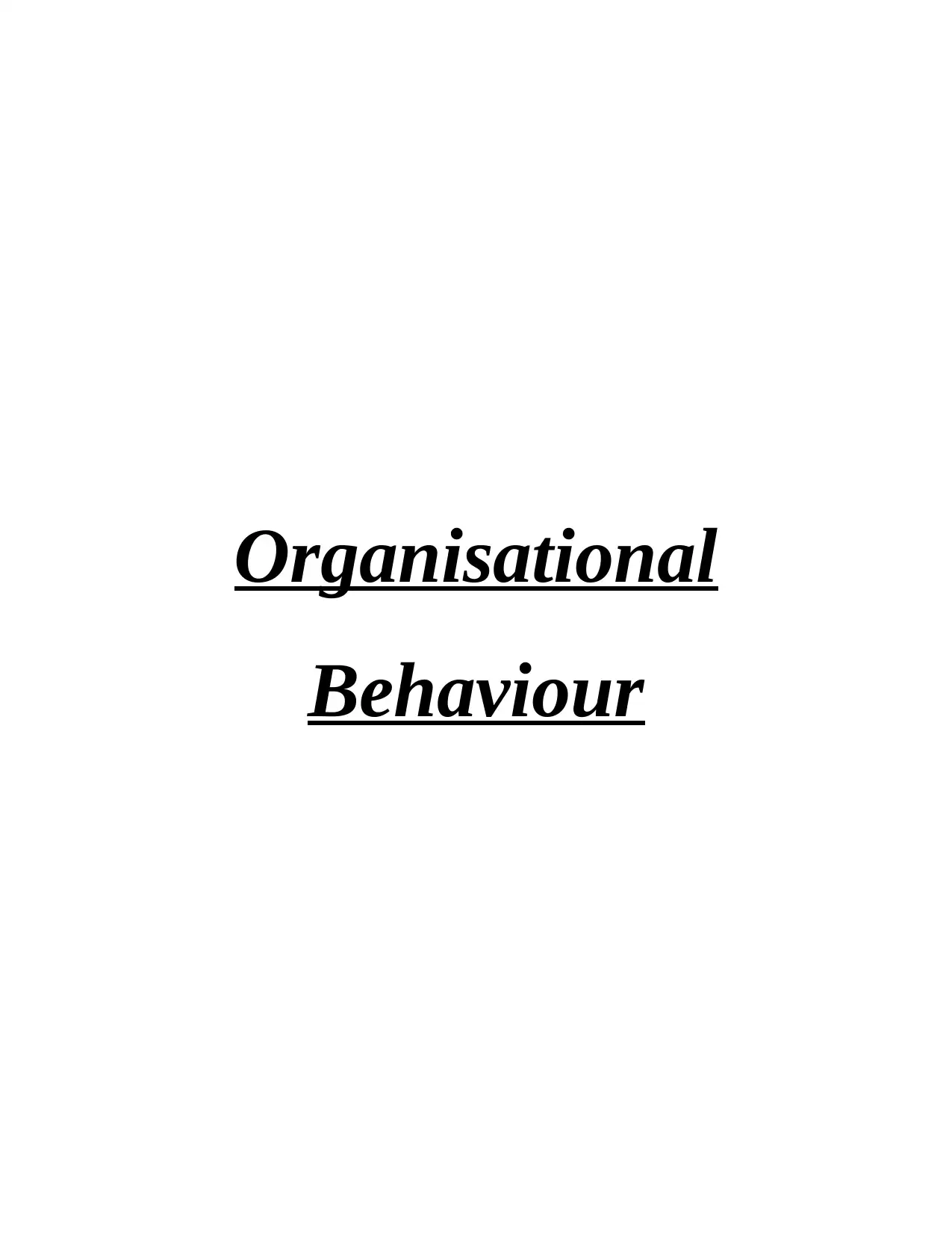
Organisational
Behaviour
Behaviour
Paraphrase This Document
Need a fresh take? Get an instant paraphrase of this document with our AI Paraphraser
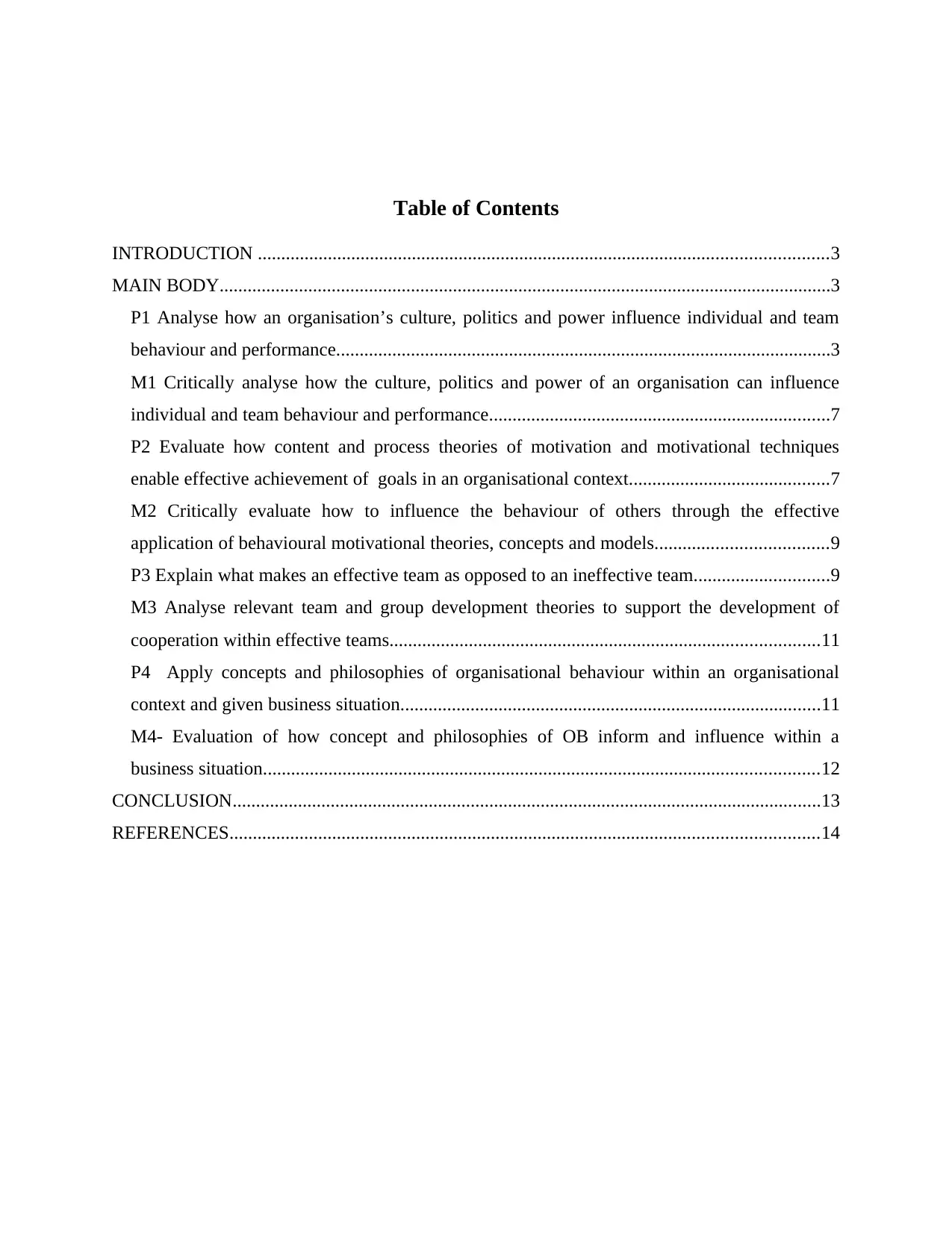
Table of Contents
INTRODUCTION ..........................................................................................................................3
MAIN BODY...................................................................................................................................3
P1 Analyse how an organisation’s culture, politics and power influence individual and team
behaviour and performance..........................................................................................................3
M1 Critically analyse how the culture, politics and power of an organisation can influence
individual and team behaviour and performance.........................................................................7
P2 Evaluate how content and process theories of motivation and motivational techniques
enable effective achievement of goals in an organisational context...........................................7
M2 Critically evaluate how to influence the behaviour of others through the effective
application of behavioural motivational theories, concepts and models.....................................9
P3 Explain what makes an effective team as opposed to an ineffective team.............................9
M3 Analyse relevant team and group development theories to support the development of
cooperation within effective teams............................................................................................11
P4 Apply concepts and philosophies of organisational behaviour within an organisational
context and given business situation..........................................................................................11
M4- Evaluation of how concept and philosophies of OB inform and influence within a
business situation.......................................................................................................................12
CONCLUSION..............................................................................................................................13
REFERENCES..............................................................................................................................14
INTRODUCTION ..........................................................................................................................3
MAIN BODY...................................................................................................................................3
P1 Analyse how an organisation’s culture, politics and power influence individual and team
behaviour and performance..........................................................................................................3
M1 Critically analyse how the culture, politics and power of an organisation can influence
individual and team behaviour and performance.........................................................................7
P2 Evaluate how content and process theories of motivation and motivational techniques
enable effective achievement of goals in an organisational context...........................................7
M2 Critically evaluate how to influence the behaviour of others through the effective
application of behavioural motivational theories, concepts and models.....................................9
P3 Explain what makes an effective team as opposed to an ineffective team.............................9
M3 Analyse relevant team and group development theories to support the development of
cooperation within effective teams............................................................................................11
P4 Apply concepts and philosophies of organisational behaviour within an organisational
context and given business situation..........................................................................................11
M4- Evaluation of how concept and philosophies of OB inform and influence within a
business situation.......................................................................................................................12
CONCLUSION..............................................................................................................................13
REFERENCES..............................................................................................................................14
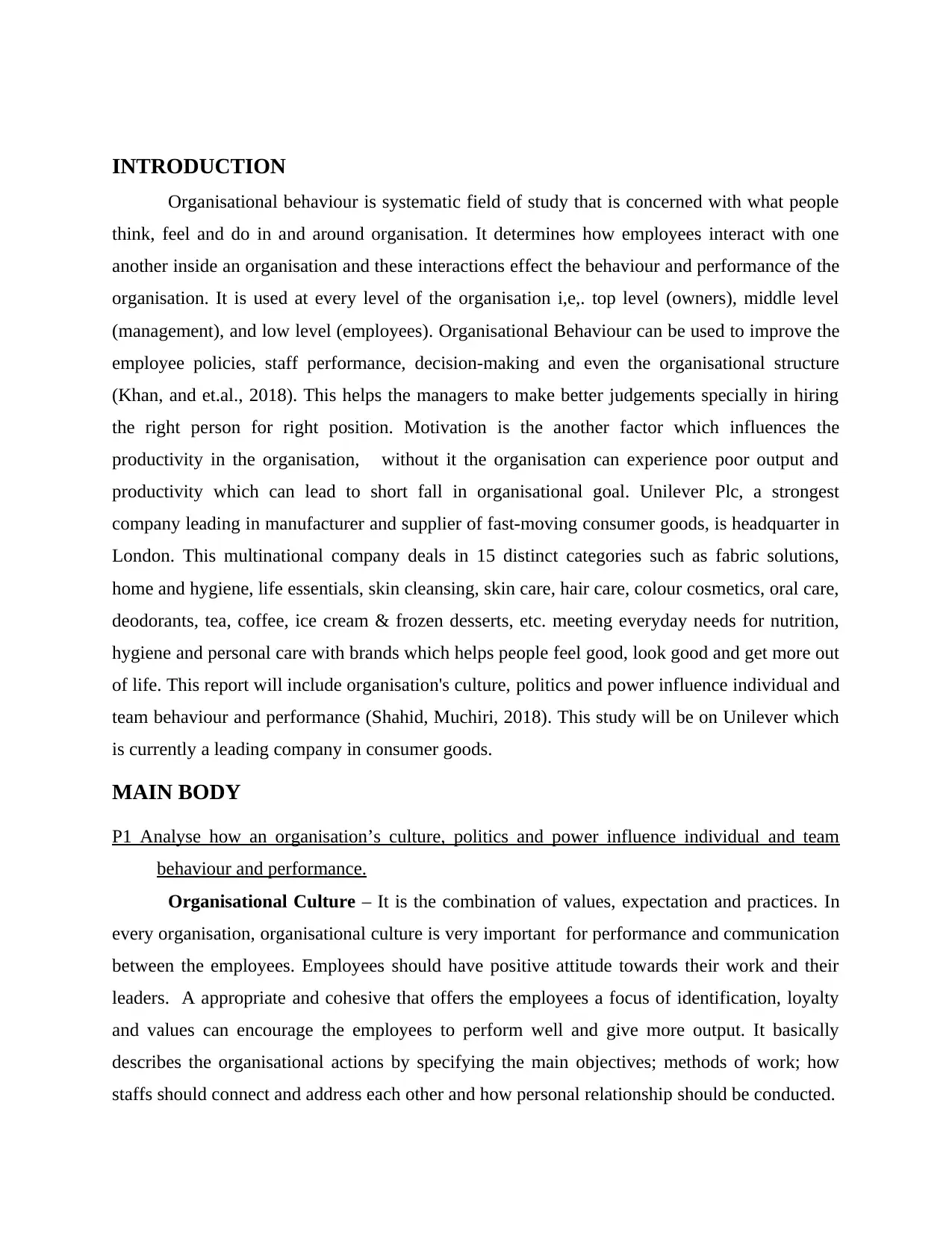
INTRODUCTION
Organisational behaviour is systematic field of study that is concerned with what people
think, feel and do in and around organisation. It determines how employees interact with one
another inside an organisation and these interactions effect the behaviour and performance of the
organisation. It is used at every level of the organisation i,e,. top level (owners), middle level
(management), and low level (employees). Organisational Behaviour can be used to improve the
employee policies, staff performance, decision-making and even the organisational structure
(Khan, and et.al., 2018). This helps the managers to make better judgements specially in hiring
the right person for right position. Motivation is the another factor which influences the
productivity in the organisation, without it the organisation can experience poor output and
productivity which can lead to short fall in organisational goal. Unilever Plc, a strongest
company leading in manufacturer and supplier of fast-moving consumer goods, is headquarter in
London. This multinational company deals in 15 distinct categories such as fabric solutions,
home and hygiene, life essentials, skin cleansing, skin care, hair care, colour cosmetics, oral care,
deodorants, tea, coffee, ice cream & frozen desserts, etc. meeting everyday needs for nutrition,
hygiene and personal care with brands which helps people feel good, look good and get more out
of life. This report will include organisation's culture, politics and power influence individual and
team behaviour and performance (Shahid, Muchiri, 2018). This study will be on Unilever which
is currently a leading company in consumer goods.
MAIN BODY
P1 Analyse how an organisation’s culture, politics and power influence individual and team
behaviour and performance.
Organisational Culture – It is the combination of values, expectation and practices. In
every organisation, organisational culture is very important for performance and communication
between the employees. Employees should have positive attitude towards their work and their
leaders. A appropriate and cohesive that offers the employees a focus of identification, loyalty
and values can encourage the employees to perform well and give more output. It basically
describes the organisational actions by specifying the main objectives; methods of work; how
staffs should connect and address each other and how personal relationship should be conducted.
Organisational behaviour is systematic field of study that is concerned with what people
think, feel and do in and around organisation. It determines how employees interact with one
another inside an organisation and these interactions effect the behaviour and performance of the
organisation. It is used at every level of the organisation i,e,. top level (owners), middle level
(management), and low level (employees). Organisational Behaviour can be used to improve the
employee policies, staff performance, decision-making and even the organisational structure
(Khan, and et.al., 2018). This helps the managers to make better judgements specially in hiring
the right person for right position. Motivation is the another factor which influences the
productivity in the organisation, without it the organisation can experience poor output and
productivity which can lead to short fall in organisational goal. Unilever Plc, a strongest
company leading in manufacturer and supplier of fast-moving consumer goods, is headquarter in
London. This multinational company deals in 15 distinct categories such as fabric solutions,
home and hygiene, life essentials, skin cleansing, skin care, hair care, colour cosmetics, oral care,
deodorants, tea, coffee, ice cream & frozen desserts, etc. meeting everyday needs for nutrition,
hygiene and personal care with brands which helps people feel good, look good and get more out
of life. This report will include organisation's culture, politics and power influence individual and
team behaviour and performance (Shahid, Muchiri, 2018). This study will be on Unilever which
is currently a leading company in consumer goods.
MAIN BODY
P1 Analyse how an organisation’s culture, politics and power influence individual and team
behaviour and performance.
Organisational Culture – It is the combination of values, expectation and practices. In
every organisation, organisational culture is very important for performance and communication
between the employees. Employees should have positive attitude towards their work and their
leaders. A appropriate and cohesive that offers the employees a focus of identification, loyalty
and values can encourage the employees to perform well and give more output. It basically
describes the organisational actions by specifying the main objectives; methods of work; how
staffs should connect and address each other and how personal relationship should be conducted.
⊘ This is a preview!⊘
Do you want full access?
Subscribe today to unlock all pages.

Trusted by 1+ million students worldwide
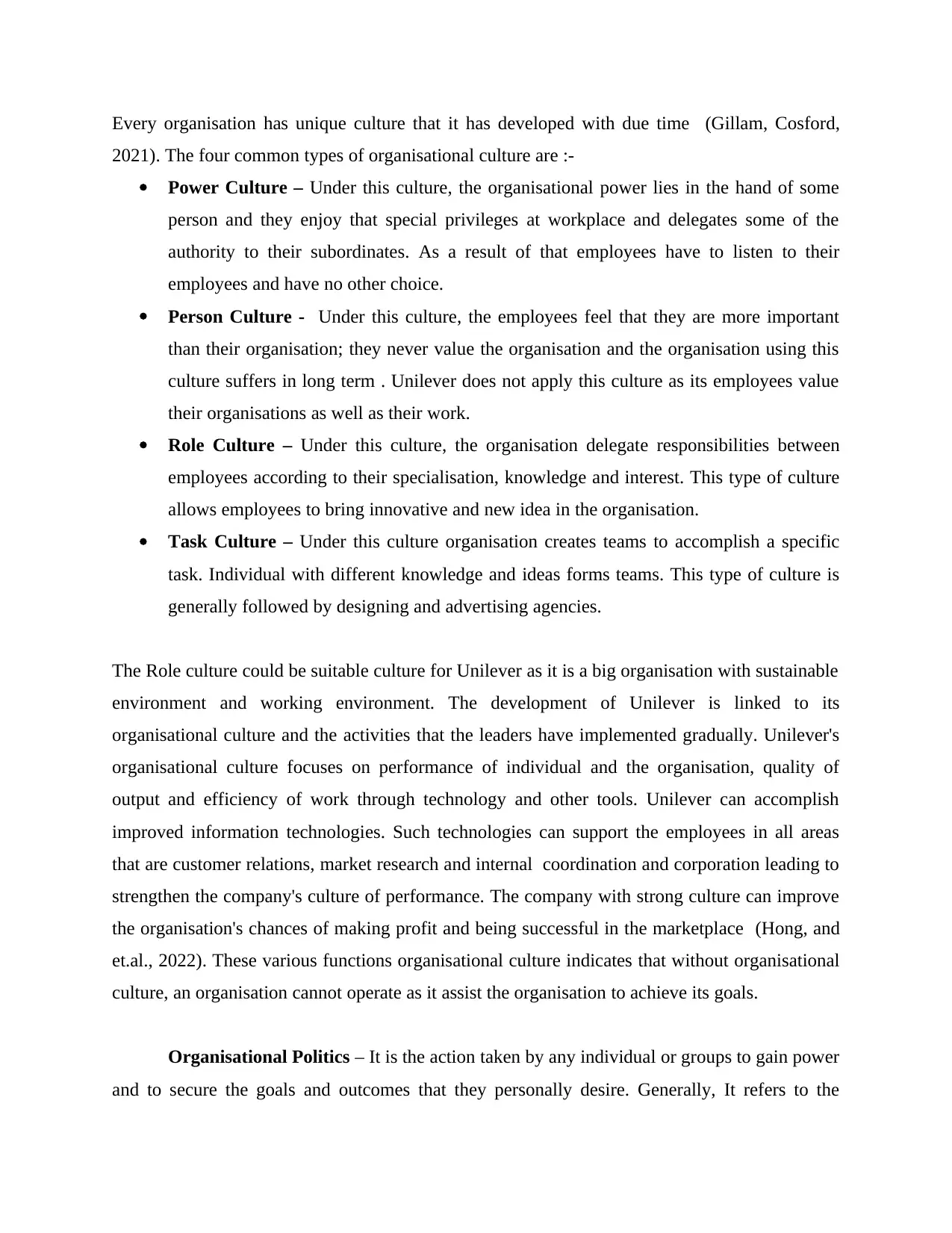
Every organisation has unique culture that it has developed with due time (Gillam, Cosford,
2021). The four common types of organisational culture are :-
Power Culture – Under this culture, the organisational power lies in the hand of some
person and they enjoy that special privileges at workplace and delegates some of the
authority to their subordinates. As a result of that employees have to listen to their
employees and have no other choice.
Person Culture - Under this culture, the employees feel that they are more important
than their organisation; they never value the organisation and the organisation using this
culture suffers in long term . Unilever does not apply this culture as its employees value
their organisations as well as their work.
Role Culture – Under this culture, the organisation delegate responsibilities between
employees according to their specialisation, knowledge and interest. This type of culture
allows employees to bring innovative and new idea in the organisation.
Task Culture – Under this culture organisation creates teams to accomplish a specific
task. Individual with different knowledge and ideas forms teams. This type of culture is
generally followed by designing and advertising agencies.
The Role culture could be suitable culture for Unilever as it is a big organisation with sustainable
environment and working environment. The development of Unilever is linked to its
organisational culture and the activities that the leaders have implemented gradually. Unilever's
organisational culture focuses on performance of individual and the organisation, quality of
output and efficiency of work through technology and other tools. Unilever can accomplish
improved information technologies. Such technologies can support the employees in all areas
that are customer relations, market research and internal coordination and corporation leading to
strengthen the company's culture of performance. The company with strong culture can improve
the organisation's chances of making profit and being successful in the marketplace (Hong, and
et.al., 2022). These various functions organisational culture indicates that without organisational
culture, an organisation cannot operate as it assist the organisation to achieve its goals.
Organisational Politics – It is the action taken by any individual or groups to gain power
and to secure the goals and outcomes that they personally desire. Generally, It refers to the
2021). The four common types of organisational culture are :-
Power Culture – Under this culture, the organisational power lies in the hand of some
person and they enjoy that special privileges at workplace and delegates some of the
authority to their subordinates. As a result of that employees have to listen to their
employees and have no other choice.
Person Culture - Under this culture, the employees feel that they are more important
than their organisation; they never value the organisation and the organisation using this
culture suffers in long term . Unilever does not apply this culture as its employees value
their organisations as well as their work.
Role Culture – Under this culture, the organisation delegate responsibilities between
employees according to their specialisation, knowledge and interest. This type of culture
allows employees to bring innovative and new idea in the organisation.
Task Culture – Under this culture organisation creates teams to accomplish a specific
task. Individual with different knowledge and ideas forms teams. This type of culture is
generally followed by designing and advertising agencies.
The Role culture could be suitable culture for Unilever as it is a big organisation with sustainable
environment and working environment. The development of Unilever is linked to its
organisational culture and the activities that the leaders have implemented gradually. Unilever's
organisational culture focuses on performance of individual and the organisation, quality of
output and efficiency of work through technology and other tools. Unilever can accomplish
improved information technologies. Such technologies can support the employees in all areas
that are customer relations, market research and internal coordination and corporation leading to
strengthen the company's culture of performance. The company with strong culture can improve
the organisation's chances of making profit and being successful in the marketplace (Hong, and
et.al., 2022). These various functions organisational culture indicates that without organisational
culture, an organisation cannot operate as it assist the organisation to achieve its goals.
Organisational Politics – It is the action taken by any individual or groups to gain power
and to secure the goals and outcomes that they personally desire. Generally, It refers to the
Paraphrase This Document
Need a fresh take? Get an instant paraphrase of this document with our AI Paraphraser
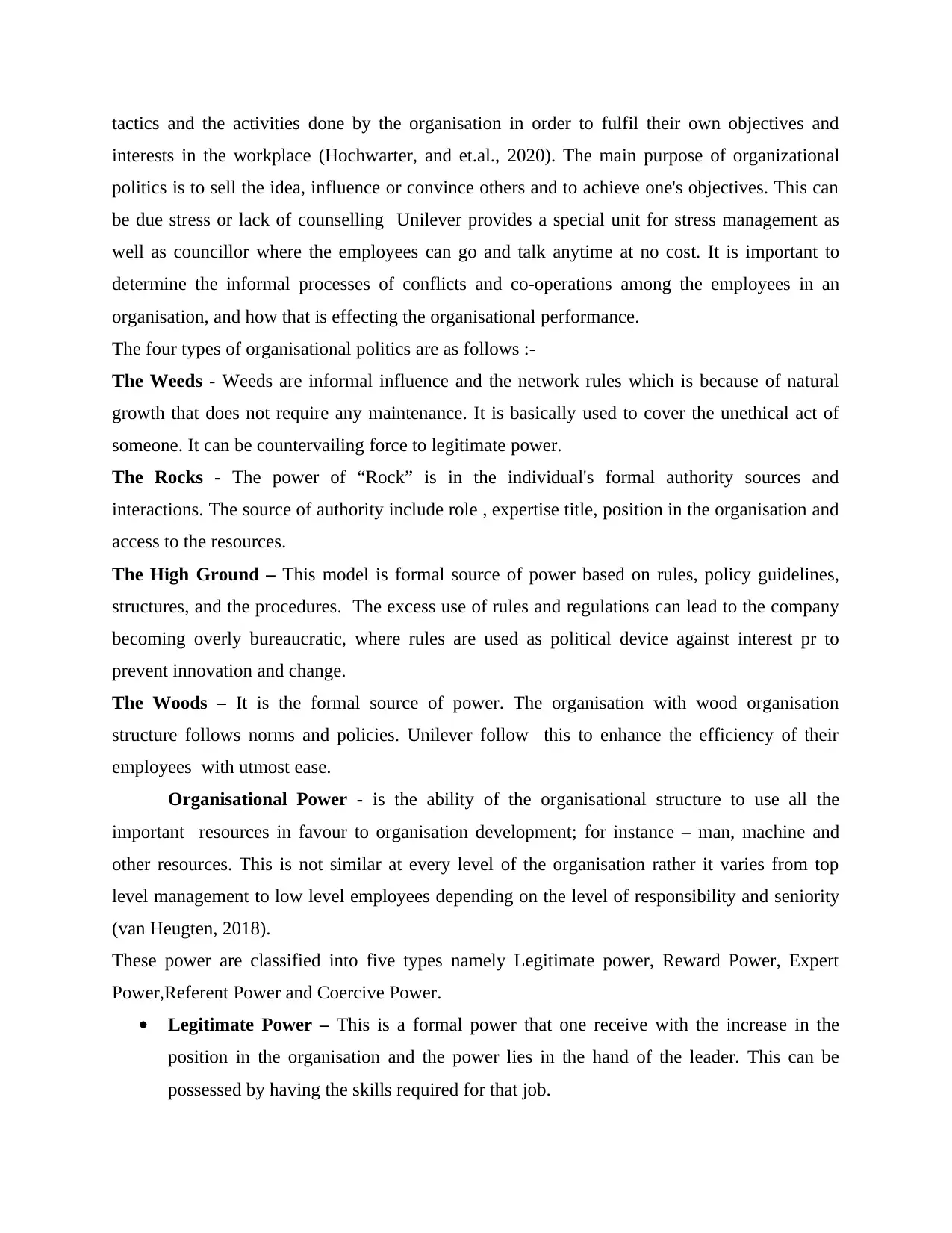
tactics and the activities done by the organisation in order to fulfil their own objectives and
interests in the workplace (Hochwarter, and et.al., 2020). The main purpose of organizational
politics is to sell the idea, influence or convince others and to achieve one's objectives. This can
be due stress or lack of counselling Unilever provides a special unit for stress management as
well as councillor where the employees can go and talk anytime at no cost. It is important to
determine the informal processes of conflicts and co-operations among the employees in an
organisation, and how that is effecting the organisational performance.
The four types of organisational politics are as follows :-
The Weeds - Weeds are informal influence and the network rules which is because of natural
growth that does not require any maintenance. It is basically used to cover the unethical act of
someone. It can be countervailing force to legitimate power.
The Rocks - The power of “Rock” is in the individual's formal authority sources and
interactions. The source of authority include role , expertise title, position in the organisation and
access to the resources.
The High Ground – This model is formal source of power based on rules, policy guidelines,
structures, and the procedures. The excess use of rules and regulations can lead to the company
becoming overly bureaucratic, where rules are used as political device against interest pr to
prevent innovation and change.
The Woods – It is the formal source of power. The organisation with wood organisation
structure follows norms and policies. Unilever follow this to enhance the efficiency of their
employees with utmost ease.
Organisational Power - is the ability of the organisational structure to use all the
important resources in favour to organisation development; for instance – man, machine and
other resources. This is not similar at every level of the organisation rather it varies from top
level management to low level employees depending on the level of responsibility and seniority
(van Heugten, 2018).
These power are classified into five types namely Legitimate power, Reward Power, Expert
Power,Referent Power and Coercive Power.
Legitimate Power – This is a formal power that one receive with the increase in the
position in the organisation and the power lies in the hand of the leader. This can be
possessed by having the skills required for that job.
interests in the workplace (Hochwarter, and et.al., 2020). The main purpose of organizational
politics is to sell the idea, influence or convince others and to achieve one's objectives. This can
be due stress or lack of counselling Unilever provides a special unit for stress management as
well as councillor where the employees can go and talk anytime at no cost. It is important to
determine the informal processes of conflicts and co-operations among the employees in an
organisation, and how that is effecting the organisational performance.
The four types of organisational politics are as follows :-
The Weeds - Weeds are informal influence and the network rules which is because of natural
growth that does not require any maintenance. It is basically used to cover the unethical act of
someone. It can be countervailing force to legitimate power.
The Rocks - The power of “Rock” is in the individual's formal authority sources and
interactions. The source of authority include role , expertise title, position in the organisation and
access to the resources.
The High Ground – This model is formal source of power based on rules, policy guidelines,
structures, and the procedures. The excess use of rules and regulations can lead to the company
becoming overly bureaucratic, where rules are used as political device against interest pr to
prevent innovation and change.
The Woods – It is the formal source of power. The organisation with wood organisation
structure follows norms and policies. Unilever follow this to enhance the efficiency of their
employees with utmost ease.
Organisational Power - is the ability of the organisational structure to use all the
important resources in favour to organisation development; for instance – man, machine and
other resources. This is not similar at every level of the organisation rather it varies from top
level management to low level employees depending on the level of responsibility and seniority
(van Heugten, 2018).
These power are classified into five types namely Legitimate power, Reward Power, Expert
Power,Referent Power and Coercive Power.
Legitimate Power – This is a formal power that one receive with the increase in the
position in the organisation and the power lies in the hand of the leader. This can be
possessed by having the skills required for that job.
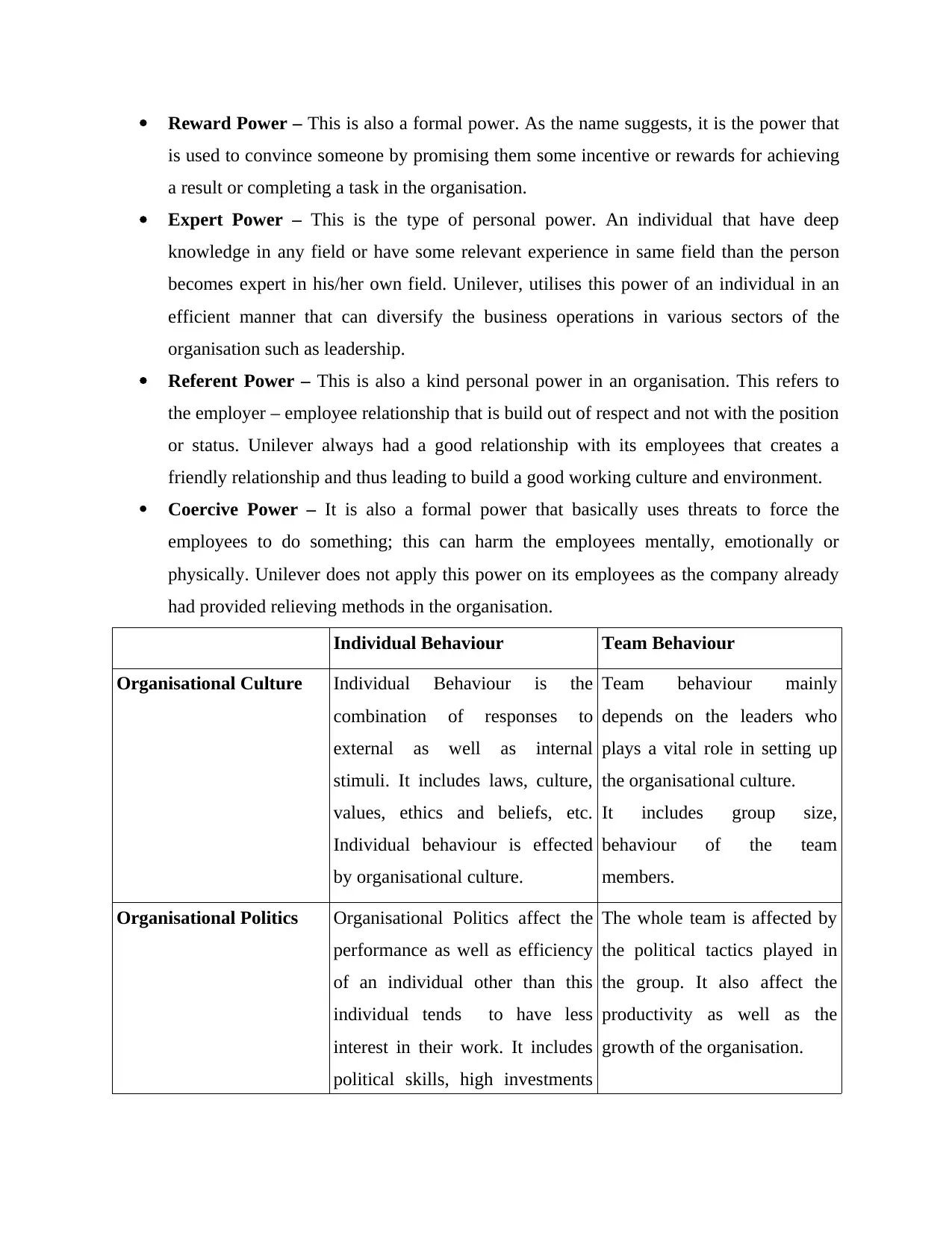
Reward Power – This is also a formal power. As the name suggests, it is the power that
is used to convince someone by promising them some incentive or rewards for achieving
a result or completing a task in the organisation.
Expert Power – This is the type of personal power. An individual that have deep
knowledge in any field or have some relevant experience in same field than the person
becomes expert in his/her own field. Unilever, utilises this power of an individual in an
efficient manner that can diversify the business operations in various sectors of the
organisation such as leadership.
Referent Power – This is also a kind personal power in an organisation. This refers to
the employer – employee relationship that is build out of respect and not with the position
or status. Unilever always had a good relationship with its employees that creates a
friendly relationship and thus leading to build a good working culture and environment.
Coercive Power – It is also a formal power that basically uses threats to force the
employees to do something; this can harm the employees mentally, emotionally or
physically. Unilever does not apply this power on its employees as the company already
had provided relieving methods in the organisation.
Individual Behaviour Team Behaviour
Organisational Culture Individual Behaviour is the
combination of responses to
external as well as internal
stimuli. It includes laws, culture,
values, ethics and beliefs, etc.
Individual behaviour is effected
by organisational culture.
Team behaviour mainly
depends on the leaders who
plays a vital role in setting up
the organisational culture.
It includes group size,
behaviour of the team
members.
Organisational Politics Organisational Politics affect the
performance as well as efficiency
of an individual other than this
individual tends to have less
interest in their work. It includes
political skills, high investments
The whole team is affected by
the political tactics played in
the group. It also affect the
productivity as well as the
growth of the organisation.
is used to convince someone by promising them some incentive or rewards for achieving
a result or completing a task in the organisation.
Expert Power – This is the type of personal power. An individual that have deep
knowledge in any field or have some relevant experience in same field than the person
becomes expert in his/her own field. Unilever, utilises this power of an individual in an
efficient manner that can diversify the business operations in various sectors of the
organisation such as leadership.
Referent Power – This is also a kind personal power in an organisation. This refers to
the employer – employee relationship that is build out of respect and not with the position
or status. Unilever always had a good relationship with its employees that creates a
friendly relationship and thus leading to build a good working culture and environment.
Coercive Power – It is also a formal power that basically uses threats to force the
employees to do something; this can harm the employees mentally, emotionally or
physically. Unilever does not apply this power on its employees as the company already
had provided relieving methods in the organisation.
Individual Behaviour Team Behaviour
Organisational Culture Individual Behaviour is the
combination of responses to
external as well as internal
stimuli. It includes laws, culture,
values, ethics and beliefs, etc.
Individual behaviour is effected
by organisational culture.
Team behaviour mainly
depends on the leaders who
plays a vital role in setting up
the organisational culture.
It includes group size,
behaviour of the team
members.
Organisational Politics Organisational Politics affect the
performance as well as efficiency
of an individual other than this
individual tends to have less
interest in their work. It includes
political skills, high investments
The whole team is affected by
the political tactics played in
the group. It also affect the
productivity as well as the
growth of the organisation.
⊘ This is a preview!⊘
Do you want full access?
Subscribe today to unlock all pages.

Trusted by 1+ million students worldwide
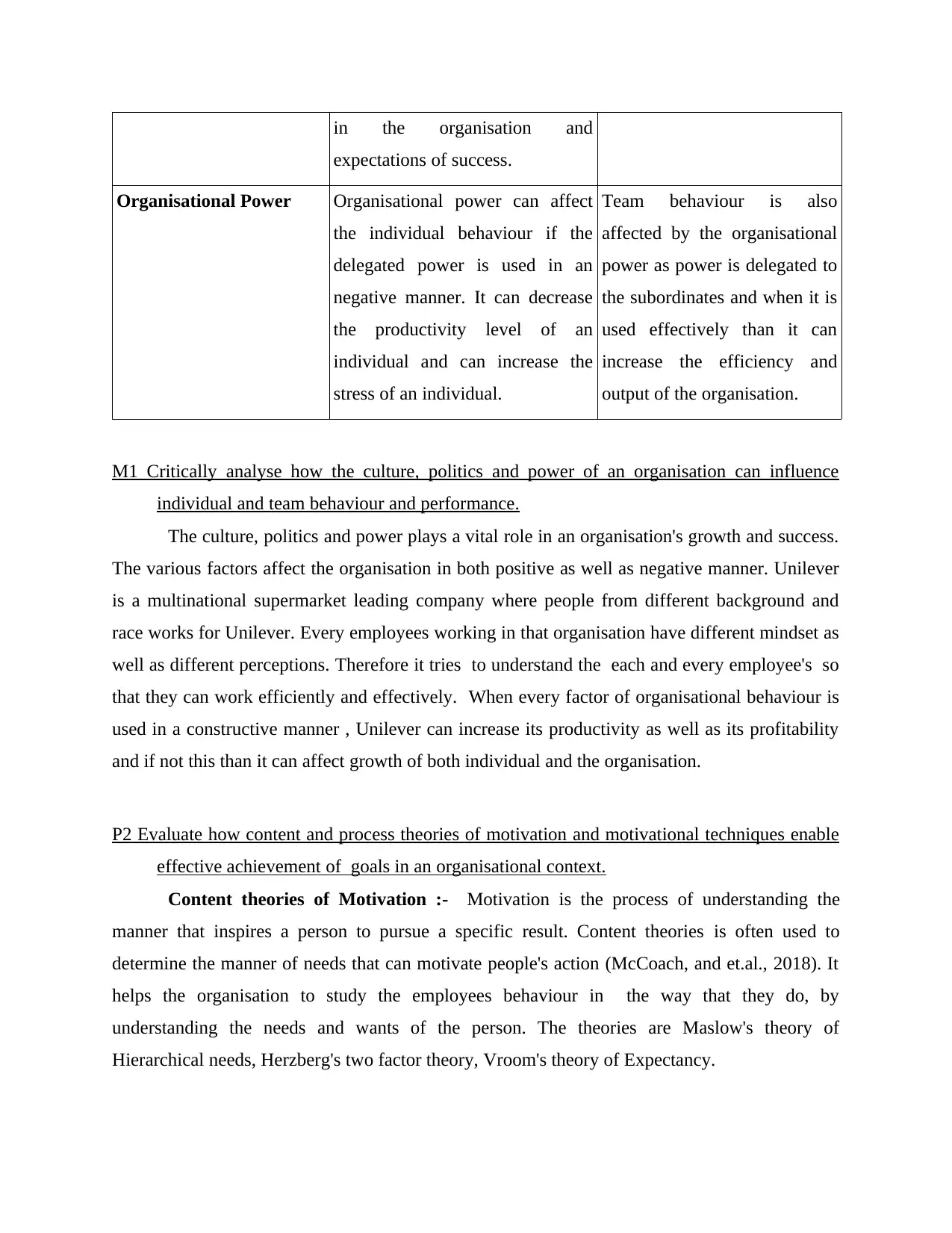
in the organisation and
expectations of success.
Organisational Power Organisational power can affect
the individual behaviour if the
delegated power is used in an
negative manner. It can decrease
the productivity level of an
individual and can increase the
stress of an individual.
Team behaviour is also
affected by the organisational
power as power is delegated to
the subordinates and when it is
used effectively than it can
increase the efficiency and
output of the organisation.
M1 Critically analyse how the culture, politics and power of an organisation can influence
individual and team behaviour and performance.
The culture, politics and power plays a vital role in an organisation's growth and success.
The various factors affect the organisation in both positive as well as negative manner. Unilever
is a multinational supermarket leading company where people from different background and
race works for Unilever. Every employees working in that organisation have different mindset as
well as different perceptions. Therefore it tries to understand the each and every employee's so
that they can work efficiently and effectively. When every factor of organisational behaviour is
used in a constructive manner , Unilever can increase its productivity as well as its profitability
and if not this than it can affect growth of both individual and the organisation.
P2 Evaluate how content and process theories of motivation and motivational techniques enable
effective achievement of goals in an organisational context.
Content theories of Motivation :- Motivation is the process of understanding the
manner that inspires a person to pursue a specific result. Content theories is often used to
determine the manner of needs that can motivate people's action (McCoach, and et.al., 2018). It
helps the organisation to study the employees behaviour in the way that they do, by
understanding the needs and wants of the person. The theories are Maslow's theory of
Hierarchical needs, Herzberg's two factor theory, Vroom's theory of Expectancy.
expectations of success.
Organisational Power Organisational power can affect
the individual behaviour if the
delegated power is used in an
negative manner. It can decrease
the productivity level of an
individual and can increase the
stress of an individual.
Team behaviour is also
affected by the organisational
power as power is delegated to
the subordinates and when it is
used effectively than it can
increase the efficiency and
output of the organisation.
M1 Critically analyse how the culture, politics and power of an organisation can influence
individual and team behaviour and performance.
The culture, politics and power plays a vital role in an organisation's growth and success.
The various factors affect the organisation in both positive as well as negative manner. Unilever
is a multinational supermarket leading company where people from different background and
race works for Unilever. Every employees working in that organisation have different mindset as
well as different perceptions. Therefore it tries to understand the each and every employee's so
that they can work efficiently and effectively. When every factor of organisational behaviour is
used in a constructive manner , Unilever can increase its productivity as well as its profitability
and if not this than it can affect growth of both individual and the organisation.
P2 Evaluate how content and process theories of motivation and motivational techniques enable
effective achievement of goals in an organisational context.
Content theories of Motivation :- Motivation is the process of understanding the
manner that inspires a person to pursue a specific result. Content theories is often used to
determine the manner of needs that can motivate people's action (McCoach, and et.al., 2018). It
helps the organisation to study the employees behaviour in the way that they do, by
understanding the needs and wants of the person. The theories are Maslow's theory of
Hierarchical needs, Herzberg's two factor theory, Vroom's theory of Expectancy.
Paraphrase This Document
Need a fresh take? Get an instant paraphrase of this document with our AI Paraphraser
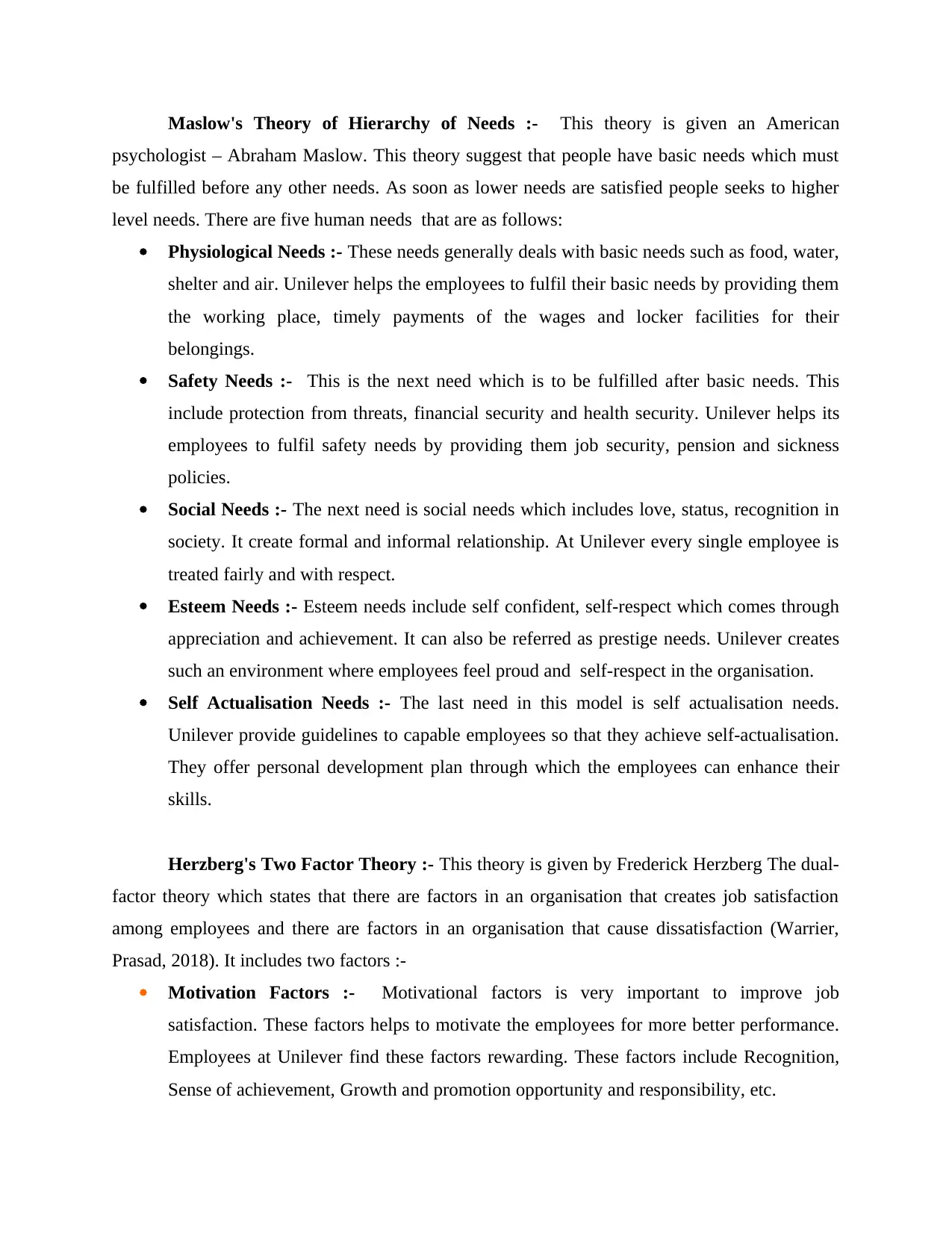
Maslow's Theory of Hierarchy of Needs :- This theory is given an American
psychologist – Abraham Maslow. This theory suggest that people have basic needs which must
be fulfilled before any other needs. As soon as lower needs are satisfied people seeks to higher
level needs. There are five human needs that are as follows:
Physiological Needs :- These needs generally deals with basic needs such as food, water,
shelter and air. Unilever helps the employees to fulfil their basic needs by providing them
the working place, timely payments of the wages and locker facilities for their
belongings.
Safety Needs :- This is the next need which is to be fulfilled after basic needs. This
include protection from threats, financial security and health security. Unilever helps its
employees to fulfil safety needs by providing them job security, pension and sickness
policies.
Social Needs :- The next need is social needs which includes love, status, recognition in
society. It create formal and informal relationship. At Unilever every single employee is
treated fairly and with respect.
Esteem Needs :- Esteem needs include self confident, self-respect which comes through
appreciation and achievement. It can also be referred as prestige needs. Unilever creates
such an environment where employees feel proud and self-respect in the organisation.
Self Actualisation Needs :- The last need in this model is self actualisation needs.
Unilever provide guidelines to capable employees so that they achieve self-actualisation.
They offer personal development plan through which the employees can enhance their
skills.
Herzberg's Two Factor Theory :- This theory is given by Frederick Herzberg The dual-
factor theory which states that there are factors in an organisation that creates job satisfaction
among employees and there are factors in an organisation that cause dissatisfaction (Warrier,
Prasad, 2018). It includes two factors :-
Motivation Factors :- Motivational factors is very important to improve job
satisfaction. These factors helps to motivate the employees for more better performance.
Employees at Unilever find these factors rewarding. These factors include Recognition,
Sense of achievement, Growth and promotion opportunity and responsibility, etc.
psychologist – Abraham Maslow. This theory suggest that people have basic needs which must
be fulfilled before any other needs. As soon as lower needs are satisfied people seeks to higher
level needs. There are five human needs that are as follows:
Physiological Needs :- These needs generally deals with basic needs such as food, water,
shelter and air. Unilever helps the employees to fulfil their basic needs by providing them
the working place, timely payments of the wages and locker facilities for their
belongings.
Safety Needs :- This is the next need which is to be fulfilled after basic needs. This
include protection from threats, financial security and health security. Unilever helps its
employees to fulfil safety needs by providing them job security, pension and sickness
policies.
Social Needs :- The next need is social needs which includes love, status, recognition in
society. It create formal and informal relationship. At Unilever every single employee is
treated fairly and with respect.
Esteem Needs :- Esteem needs include self confident, self-respect which comes through
appreciation and achievement. It can also be referred as prestige needs. Unilever creates
such an environment where employees feel proud and self-respect in the organisation.
Self Actualisation Needs :- The last need in this model is self actualisation needs.
Unilever provide guidelines to capable employees so that they achieve self-actualisation.
They offer personal development plan through which the employees can enhance their
skills.
Herzberg's Two Factor Theory :- This theory is given by Frederick Herzberg The dual-
factor theory which states that there are factors in an organisation that creates job satisfaction
among employees and there are factors in an organisation that cause dissatisfaction (Warrier,
Prasad, 2018). It includes two factors :-
Motivation Factors :- Motivational factors is very important to improve job
satisfaction. These factors helps to motivate the employees for more better performance.
Employees at Unilever find these factors rewarding. These factors include Recognition,
Sense of achievement, Growth and promotion opportunity and responsibility, etc.
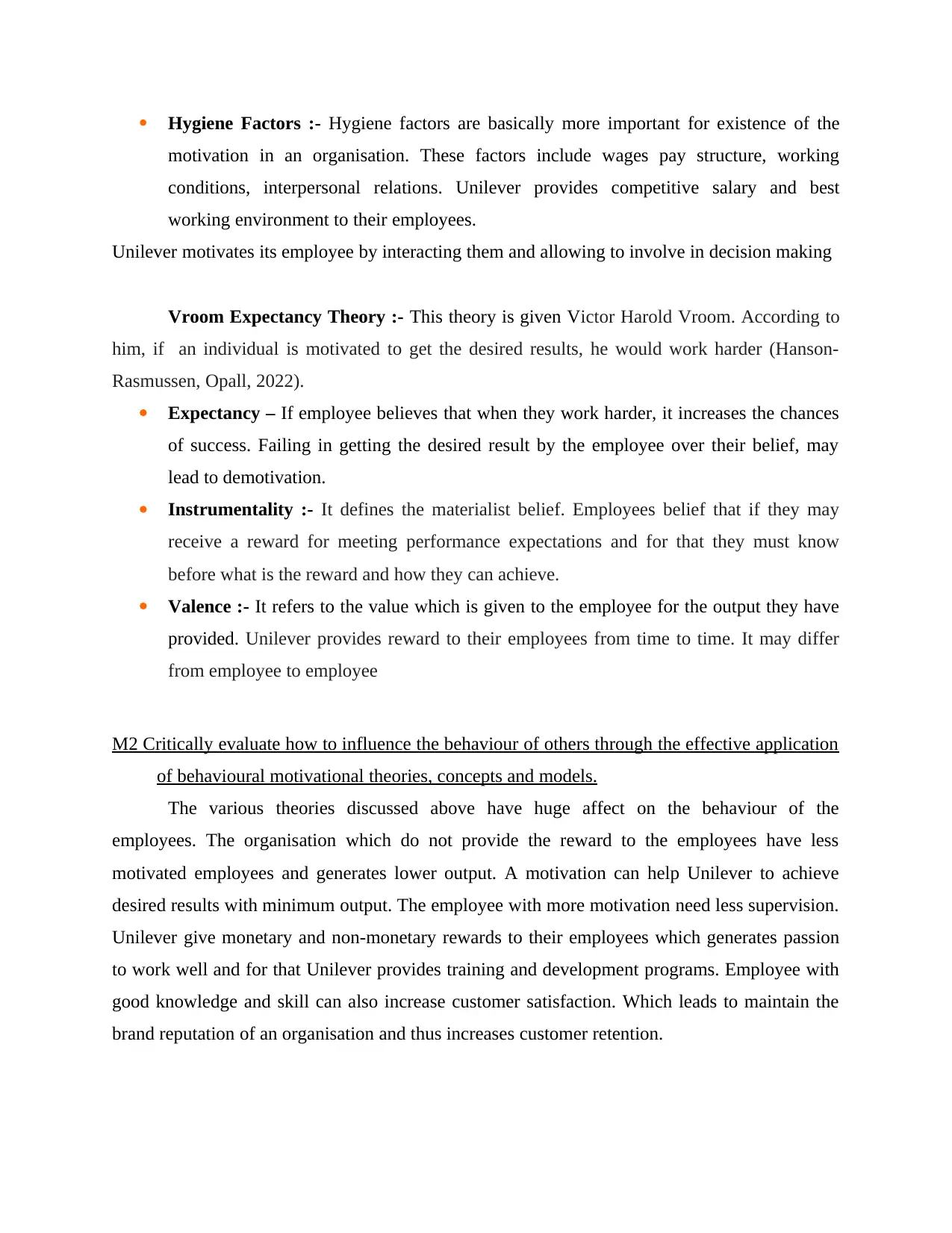
Hygiene Factors :- Hygiene factors are basically more important for existence of the
motivation in an organisation. These factors include wages pay structure, working
conditions, interpersonal relations. Unilever provides competitive salary and best
working environment to their employees.
Unilever motivates its employee by interacting them and allowing to involve in decision making
Vroom Expectancy Theory :- This theory is given Victor Harold Vroom. According to
him, if an individual is motivated to get the desired results, he would work harder (Hanson-
Rasmussen, Opall, 2022).
Expectancy – If employee believes that when they work harder, it increases the chances
of success. Failing in getting the desired result by the employee over their belief, may
lead to demotivation.
Instrumentality :- It defines the materialist belief. Employees belief that if they may
receive a reward for meeting performance expectations and for that they must know
before what is the reward and how they can achieve.
Valence :- It refers to the value which is given to the employee for the output they have
provided. Unilever provides reward to their employees from time to time. It may differ
from employee to employee
M2 Critically evaluate how to influence the behaviour of others through the effective application
of behavioural motivational theories, concepts and models.
The various theories discussed above have huge affect on the behaviour of the
employees. The organisation which do not provide the reward to the employees have less
motivated employees and generates lower output. A motivation can help Unilever to achieve
desired results with minimum output. The employee with more motivation need less supervision.
Unilever give monetary and non-monetary rewards to their employees which generates passion
to work well and for that Unilever provides training and development programs. Employee with
good knowledge and skill can also increase customer satisfaction. Which leads to maintain the
brand reputation of an organisation and thus increases customer retention.
motivation in an organisation. These factors include wages pay structure, working
conditions, interpersonal relations. Unilever provides competitive salary and best
working environment to their employees.
Unilever motivates its employee by interacting them and allowing to involve in decision making
Vroom Expectancy Theory :- This theory is given Victor Harold Vroom. According to
him, if an individual is motivated to get the desired results, he would work harder (Hanson-
Rasmussen, Opall, 2022).
Expectancy – If employee believes that when they work harder, it increases the chances
of success. Failing in getting the desired result by the employee over their belief, may
lead to demotivation.
Instrumentality :- It defines the materialist belief. Employees belief that if they may
receive a reward for meeting performance expectations and for that they must know
before what is the reward and how they can achieve.
Valence :- It refers to the value which is given to the employee for the output they have
provided. Unilever provides reward to their employees from time to time. It may differ
from employee to employee
M2 Critically evaluate how to influence the behaviour of others through the effective application
of behavioural motivational theories, concepts and models.
The various theories discussed above have huge affect on the behaviour of the
employees. The organisation which do not provide the reward to the employees have less
motivated employees and generates lower output. A motivation can help Unilever to achieve
desired results with minimum output. The employee with more motivation need less supervision.
Unilever give monetary and non-monetary rewards to their employees which generates passion
to work well and for that Unilever provides training and development programs. Employee with
good knowledge and skill can also increase customer satisfaction. Which leads to maintain the
brand reputation of an organisation and thus increases customer retention.
⊘ This is a preview!⊘
Do you want full access?
Subscribe today to unlock all pages.

Trusted by 1+ million students worldwide
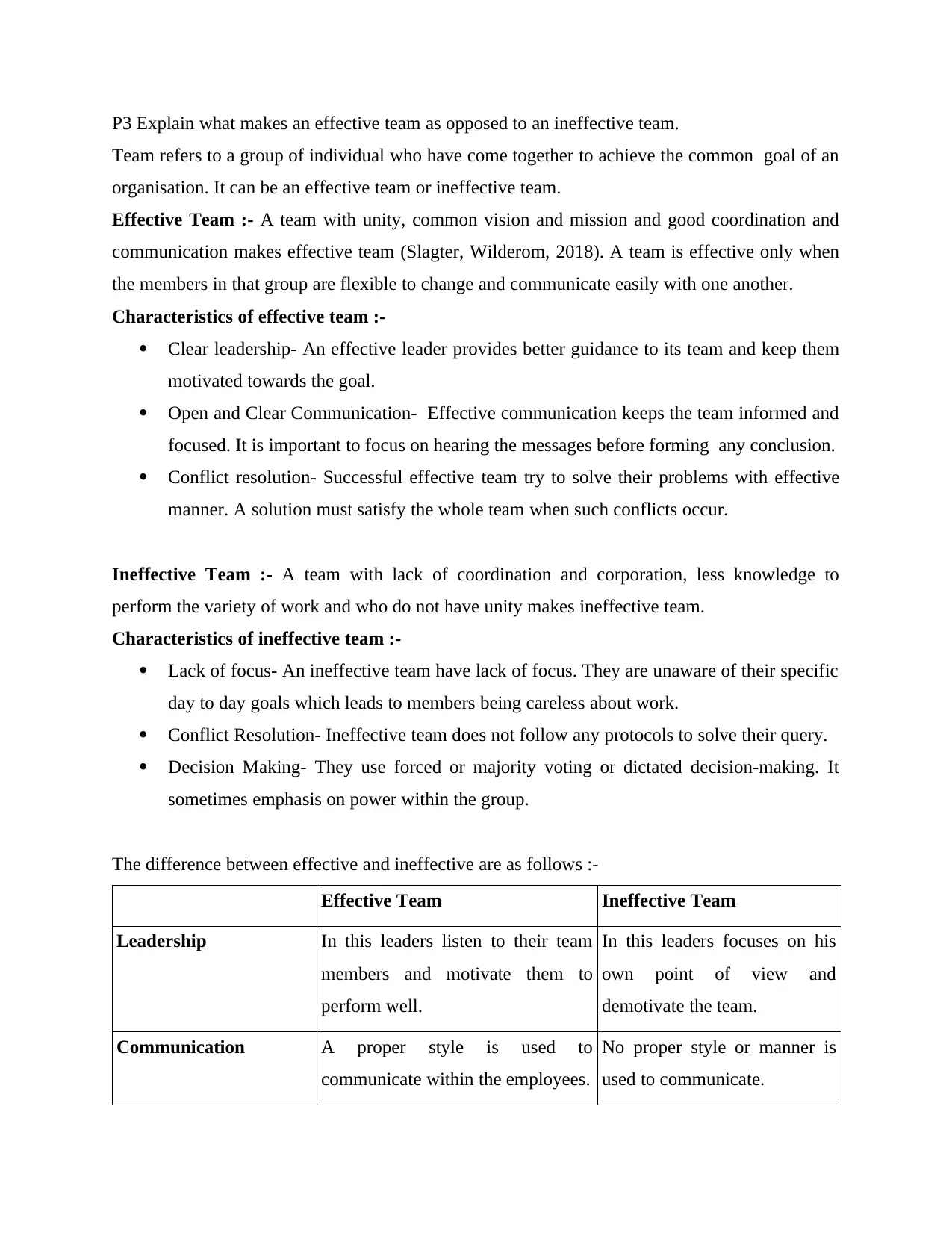
P3 Explain what makes an effective team as opposed to an ineffective team.
Team refers to a group of individual who have come together to achieve the common goal of an
organisation. It can be an effective team or ineffective team.
Effective Team :- A team with unity, common vision and mission and good coordination and
communication makes effective team (Slagter, Wilderom, 2018). A team is effective only when
the members in that group are flexible to change and communicate easily with one another.
Characteristics of effective team :-
Clear leadership- An effective leader provides better guidance to its team and keep them
motivated towards the goal.
Open and Clear Communication- Effective communication keeps the team informed and
focused. It is important to focus on hearing the messages before forming any conclusion.
Conflict resolution- Successful effective team try to solve their problems with effective
manner. A solution must satisfy the whole team when such conflicts occur.
Ineffective Team :- A team with lack of coordination and corporation, less knowledge to
perform the variety of work and who do not have unity makes ineffective team.
Characteristics of ineffective team :-
Lack of focus- An ineffective team have lack of focus. They are unaware of their specific
day to day goals which leads to members being careless about work.
Conflict Resolution- Ineffective team does not follow any protocols to solve their query.
Decision Making- They use forced or majority voting or dictated decision-making. It
sometimes emphasis on power within the group.
The difference between effective and ineffective are as follows :-
Effective Team Ineffective Team
Leadership In this leaders listen to their team
members and motivate them to
perform well.
In this leaders focuses on his
own point of view and
demotivate the team.
Communication A proper style is used to
communicate within the employees.
No proper style or manner is
used to communicate.
Team refers to a group of individual who have come together to achieve the common goal of an
organisation. It can be an effective team or ineffective team.
Effective Team :- A team with unity, common vision and mission and good coordination and
communication makes effective team (Slagter, Wilderom, 2018). A team is effective only when
the members in that group are flexible to change and communicate easily with one another.
Characteristics of effective team :-
Clear leadership- An effective leader provides better guidance to its team and keep them
motivated towards the goal.
Open and Clear Communication- Effective communication keeps the team informed and
focused. It is important to focus on hearing the messages before forming any conclusion.
Conflict resolution- Successful effective team try to solve their problems with effective
manner. A solution must satisfy the whole team when such conflicts occur.
Ineffective Team :- A team with lack of coordination and corporation, less knowledge to
perform the variety of work and who do not have unity makes ineffective team.
Characteristics of ineffective team :-
Lack of focus- An ineffective team have lack of focus. They are unaware of their specific
day to day goals which leads to members being careless about work.
Conflict Resolution- Ineffective team does not follow any protocols to solve their query.
Decision Making- They use forced or majority voting or dictated decision-making. It
sometimes emphasis on power within the group.
The difference between effective and ineffective are as follows :-
Effective Team Ineffective Team
Leadership In this leaders listen to their team
members and motivate them to
perform well.
In this leaders focuses on his
own point of view and
demotivate the team.
Communication A proper style is used to
communicate within the employees.
No proper style or manner is
used to communicate.
Paraphrase This Document
Need a fresh take? Get an instant paraphrase of this document with our AI Paraphraser
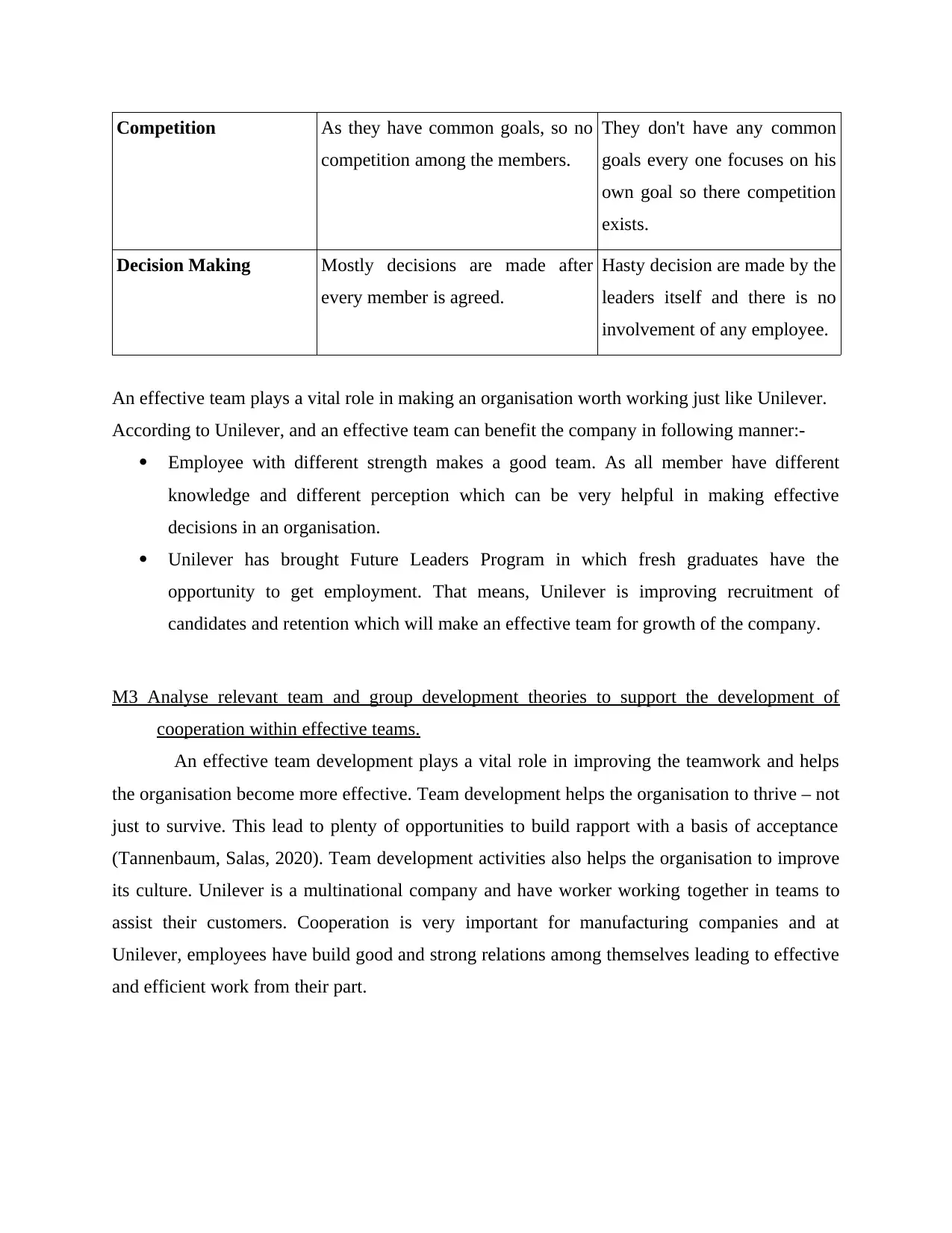
Competition As they have common goals, so no
competition among the members.
They don't have any common
goals every one focuses on his
own goal so there competition
exists.
Decision Making Mostly decisions are made after
every member is agreed.
Hasty decision are made by the
leaders itself and there is no
involvement of any employee.
An effective team plays a vital role in making an organisation worth working just like Unilever.
According to Unilever, and an effective team can benefit the company in following manner:-
Employee with different strength makes a good team. As all member have different
knowledge and different perception which can be very helpful in making effective
decisions in an organisation.
Unilever has brought Future Leaders Program in which fresh graduates have the
opportunity to get employment. That means, Unilever is improving recruitment of
candidates and retention which will make an effective team for growth of the company.
M3 Analyse relevant team and group development theories to support the development of
cooperation within effective teams.
An effective team development plays a vital role in improving the teamwork and helps
the organisation become more effective. Team development helps the organisation to thrive – not
just to survive. This lead to plenty of opportunities to build rapport with a basis of acceptance
(Tannenbaum, Salas, 2020). Team development activities also helps the organisation to improve
its culture. Unilever is a multinational company and have worker working together in teams to
assist their customers. Cooperation is very important for manufacturing companies and at
Unilever, employees have build good and strong relations among themselves leading to effective
and efficient work from their part.
competition among the members.
They don't have any common
goals every one focuses on his
own goal so there competition
exists.
Decision Making Mostly decisions are made after
every member is agreed.
Hasty decision are made by the
leaders itself and there is no
involvement of any employee.
An effective team plays a vital role in making an organisation worth working just like Unilever.
According to Unilever, and an effective team can benefit the company in following manner:-
Employee with different strength makes a good team. As all member have different
knowledge and different perception which can be very helpful in making effective
decisions in an organisation.
Unilever has brought Future Leaders Program in which fresh graduates have the
opportunity to get employment. That means, Unilever is improving recruitment of
candidates and retention which will make an effective team for growth of the company.
M3 Analyse relevant team and group development theories to support the development of
cooperation within effective teams.
An effective team development plays a vital role in improving the teamwork and helps
the organisation become more effective. Team development helps the organisation to thrive – not
just to survive. This lead to plenty of opportunities to build rapport with a basis of acceptance
(Tannenbaum, Salas, 2020). Team development activities also helps the organisation to improve
its culture. Unilever is a multinational company and have worker working together in teams to
assist their customers. Cooperation is very important for manufacturing companies and at
Unilever, employees have build good and strong relations among themselves leading to effective
and efficient work from their part.
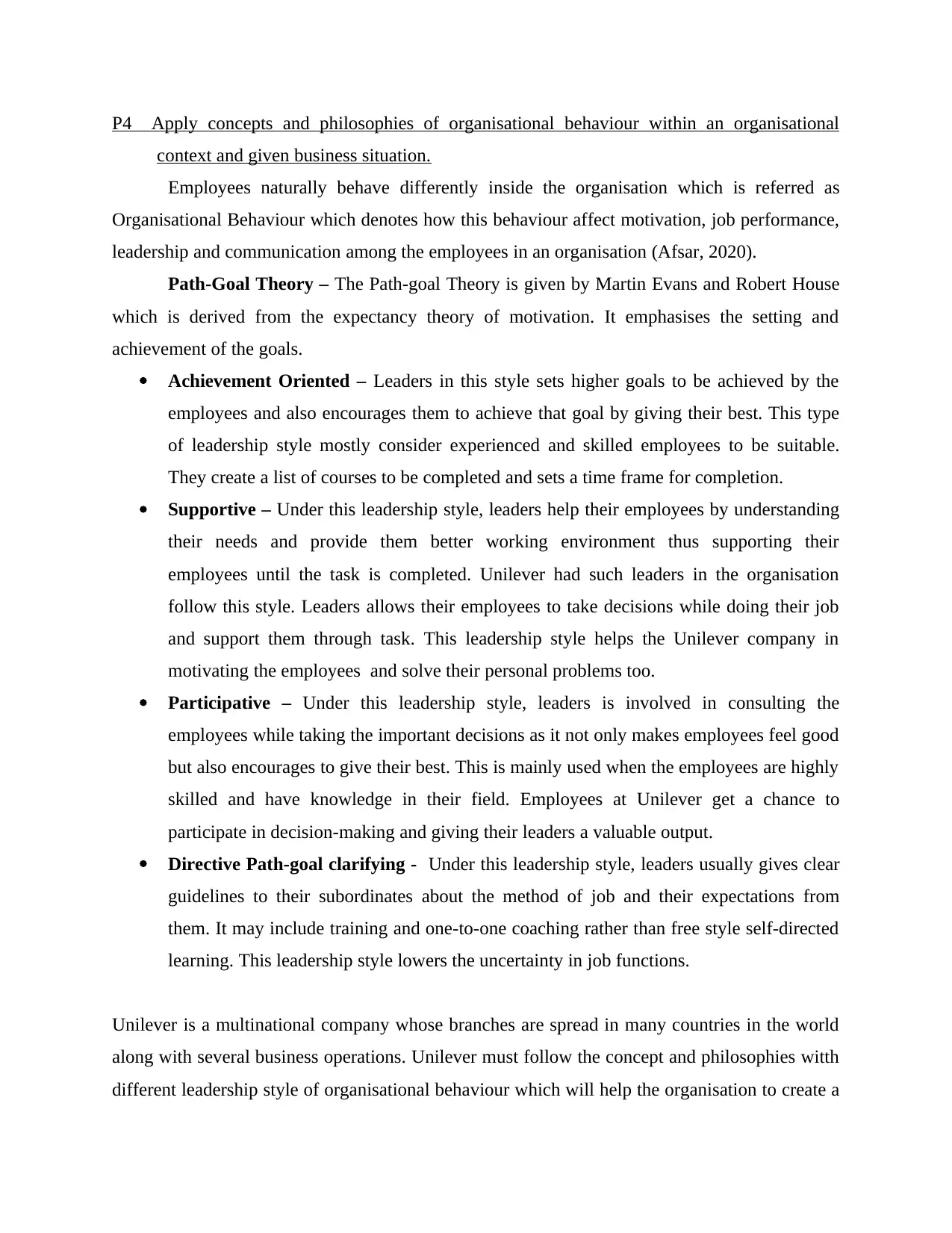
P4 Apply concepts and philosophies of organisational behaviour within an organisational
context and given business situation.
Employees naturally behave differently inside the organisation which is referred as
Organisational Behaviour which denotes how this behaviour affect motivation, job performance,
leadership and communication among the employees in an organisation (Afsar, 2020).
Path-Goal Theory – The Path-goal Theory is given by Martin Evans and Robert House
which is derived from the expectancy theory of motivation. It emphasises the setting and
achievement of the goals.
Achievement Oriented – Leaders in this style sets higher goals to be achieved by the
employees and also encourages them to achieve that goal by giving their best. This type
of leadership style mostly consider experienced and skilled employees to be suitable.
They create a list of courses to be completed and sets a time frame for completion.
Supportive – Under this leadership style, leaders help their employees by understanding
their needs and provide them better working environment thus supporting their
employees until the task is completed. Unilever had such leaders in the organisation
follow this style. Leaders allows their employees to take decisions while doing their job
and support them through task. This leadership style helps the Unilever company in
motivating the employees and solve their personal problems too.
Participative – Under this leadership style, leaders is involved in consulting the
employees while taking the important decisions as it not only makes employees feel good
but also encourages to give their best. This is mainly used when the employees are highly
skilled and have knowledge in their field. Employees at Unilever get a chance to
participate in decision-making and giving their leaders a valuable output.
Directive Path-goal clarifying - Under this leadership style, leaders usually gives clear
guidelines to their subordinates about the method of job and their expectations from
them. It may include training and one-to-one coaching rather than free style self-directed
learning. This leadership style lowers the uncertainty in job functions.
Unilever is a multinational company whose branches are spread in many countries in the world
along with several business operations. Unilever must follow the concept and philosophies witth
different leadership style of organisational behaviour which will help the organisation to create a
context and given business situation.
Employees naturally behave differently inside the organisation which is referred as
Organisational Behaviour which denotes how this behaviour affect motivation, job performance,
leadership and communication among the employees in an organisation (Afsar, 2020).
Path-Goal Theory – The Path-goal Theory is given by Martin Evans and Robert House
which is derived from the expectancy theory of motivation. It emphasises the setting and
achievement of the goals.
Achievement Oriented – Leaders in this style sets higher goals to be achieved by the
employees and also encourages them to achieve that goal by giving their best. This type
of leadership style mostly consider experienced and skilled employees to be suitable.
They create a list of courses to be completed and sets a time frame for completion.
Supportive – Under this leadership style, leaders help their employees by understanding
their needs and provide them better working environment thus supporting their
employees until the task is completed. Unilever had such leaders in the organisation
follow this style. Leaders allows their employees to take decisions while doing their job
and support them through task. This leadership style helps the Unilever company in
motivating the employees and solve their personal problems too.
Participative – Under this leadership style, leaders is involved in consulting the
employees while taking the important decisions as it not only makes employees feel good
but also encourages to give their best. This is mainly used when the employees are highly
skilled and have knowledge in their field. Employees at Unilever get a chance to
participate in decision-making and giving their leaders a valuable output.
Directive Path-goal clarifying - Under this leadership style, leaders usually gives clear
guidelines to their subordinates about the method of job and their expectations from
them. It may include training and one-to-one coaching rather than free style self-directed
learning. This leadership style lowers the uncertainty in job functions.
Unilever is a multinational company whose branches are spread in many countries in the world
along with several business operations. Unilever must follow the concept and philosophies witth
different leadership style of organisational behaviour which will help the organisation to create a
⊘ This is a preview!⊘
Do you want full access?
Subscribe today to unlock all pages.

Trusted by 1+ million students worldwide
1 out of 16
Related Documents
Your All-in-One AI-Powered Toolkit for Academic Success.
+13062052269
info@desklib.com
Available 24*7 on WhatsApp / Email
![[object Object]](/_next/static/media/star-bottom.7253800d.svg)
Unlock your academic potential
Copyright © 2020–2026 A2Z Services. All Rights Reserved. Developed and managed by ZUCOL.


